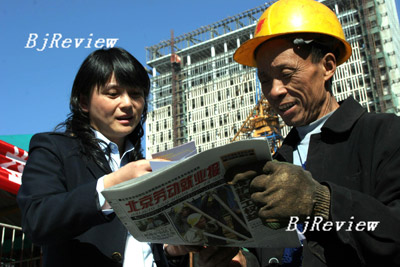|
While Gong was attacked by legal experts, especially the drafters of the laws, for delaying an essential part of a prospective civil code, Gong was widely supported by tens of thousands of Internet users, who worried about the widening income gap in society and about fraud and corruption in some people's headlong pursuit of private wealth.
This group posted items on online forums to support Gong and even praised him as a national hero. Gong's concerns have also been echoed by a handful of sociologists who suspect the country's first law to protect private ownership could undermine the legal foundation of China's socialist system.
The vocal war between the two camps of scholars and citizens, which sometimes evolved into a debate over who was trying to make the drafting process a political issue, immediately attracted the attention of China's legislature.
In September 2005, Gong was summoned to a one-and-a-half-hour meeting with leaders of the Commission of Legislative Affairs of the NPC Standing Committee. In an interview in February, Gong told the newspaper Southern Weekend that officials had briefed him on the whole process of drafting the property rights law. Gong said that at the end of the meeting "an official from the Commission of Legislative Affairs said to me that I was so far the only scholar to be asked for suggestions on a law."
Two weeks later, at a meeting with the law's drafting team, Wu put forward three requirements: their work must adhere to the correct political direction, the orientation should be the practical situation of China and copying provisions from the West is forbidden, and the basis of China's socialist economy is public ownership, which is essentially different from Western capitalist private ownership.
The final four deliberations over the course of one year saw the fulfillment of these requirements. When the law went into the seventh deliberation in December, it added a provision on the protection of state-owned assets that said, "Those who cause the loss of state-owned assets due to mismanagement and abuse of power should bear legal liability." The most recent draft has also stressed public ownership as the heart of the country's basic economic system.
The other hotly debated provisions-such as whether affluent urbanites can purchase prime country real estate to build holiday homes and retreats and how builders can renew the grant of land use when the 70-year term expires-have been subjected to repeated revisions during the seven readings. In the process, citizens got to know every revision of the draft from the media and their suggestions to a large extent decided the outcome of the next reading.
Revising a law

On October 27, 2005, the NPC Standing Committee adopted the revised law on personal income tax-effective as of January 1, 2006-which raised the cutoff point of residents' monthly income from the previous 800 yuan in most provinces and cities to 1,600 yuan. The cutoff point represented the majority opinion at a public hearing in September, the first time the NPC Standing Committee solicited public opinions on a revision of a law, through hosting a hearing of 20 people. The hearing in Beijing was open to nationwide application by any citizen above 18 years of age who earns a salary, and to facilitate the registration process online applications were accepted. The quotas for representatives were proportionally allocated to citizens from different regions, with different income levels and those who had different opinions about the income tax reduction so as to comprehensively reflect citizens' opinions.
| 